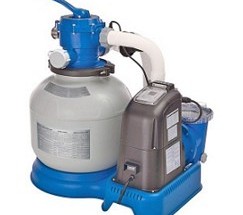Any filter system of pool water should work as a single well-coordinated mechanism. The calculated amount of water intake, the required number of skimmers and overflow drain, if necessary, will be a set of useless devices, unless you select the correct filter. The advantages of a quality filter greatly facilitate the life of other filtering mechanisms, but any choice should be supported by calculation.
Content
Filtration installation of the pool, the principle of operation
The main element of the pool of the countryside is the filter unit, without which the quality of water will be disgusting.
Undoubtedly, correctly and correctly selected and installed filter for the pool will ensure a long life of the artificial reservoir with minimal costs for disinfection of water.
Moreover, the recommended standards for filtering water and cleaning the pool in hot weather are 3 days. Purification of water using a filter is the most accessible and reliable way to get rid of solid and colloidal impurities. By what criteria and how to choose the right filter for the pool?
The operation of the cleaning filter is simple and consists in screening out large and microscopic particles by passing water through a pump. Naturally, the degree of purification and the volume of water being passed depend on the rate of filtration. Therefore, the filtration unit is selected taking into account the volume of water and the type of swimming facility.
Pool filters, types
Modern filtration systems for swimming pools are designated by three solid types:
• cartridge
• diatoms
• Sand.
The principle of operation of all types is based on elementary mechanical filtration of water.
Have cartridge The filtering element is a propylene membrane. Compact size filters in a convenient cassette allow you to install them directly on the edge of the pool. This type requires frequent flushing of the filter element. However, low cost makes it easy to replace contaminated cartridges. Cartridge filters are preferably installed on frame and inflatable small-volume pools.
Diatomaceous the type of filter is considered the most effective for water purification. The filter is assembled from several (2-3) cartridges filled with diatomite material, which is microscopic fossil particles. The presence of a package of cartridges neutralizes most protozoa and microbes, providing a high degree of water purification. However, this type of filter is expensive due to the use of natural minerals (skeletal mass). Diatomaceous filter can be used for stationary and constructed swimming pools.
The most accessible and popular is the sand filter for the pool. The design of the sand filter is characterized by a simple principle of operation, based on the natural filtration of water through quartz sand. Exaggerated, the filter is a tank (tank) with a filler on the bottom, water is applied through the pump through it.
Therefore, as a filter layer I use a multilayer filter made of quartz sand, gravel and fine carbon anthracite. The fraction of the filter element is 0.4-0.8 mm.
The cost of quartz sand for pool filters is negligible. The filtration of water using this type occurs quickly and qualitatively.
The only drawback is the cumbersome and weighty design of the filter unit, which is preferable to use for stationary pools of impressive water volume.
Popular sand filter models without a pump are:
Emaux FSP350-4W
Kripsol Sevilla STN406-25
Behncke Cristall D900
models equipped with a pump:
Kripsol GRANADA GTN406-33
Kripsol - Balear BL 760.
Choose a filter, tips
Filtration plants from the manufacturer are a working system of the circulation pump and the filter itself. Therefore, it is advisable to purchase a brand set of the manufacturer with a pump-filtering water purification system. For example, filter intex for frame or inflatable pools.
More solid Intex models are equipped with a chlorine generator (Krystal Clear Saltwater System 54602), which is combined with a filter pump of sand or cartridge type.
Some manufacturers of aggregates in the scope of supply include a six-position valve of operating modes and a manometer. The maximum working pressure of industrial filters can reach up to 2.5 kg / cm2.
Therefore, the unit must be equipped with a device and a bleed valve, and on the rinse water outlet - with a transparent glass insert for visual monitoring of water quality.
To understand which is better to use the pool filter, it is necessary to make a simple calculation.
Calculating the filter for the pool
The volume of circulating water in filtration plants undergoes a full cycle of purification during the day 4-6 times. If you look at the filtration system of the basin through the prism of SNiP and SanPiN, you need to calculate:
• recirculation flow
• selection of the circulation pump
• the volume of water intended for washing the filter.
Consider how to make a calculation using the sand filter.
calculation of recirculation flow
Calculation of the flow of recirculation is the main parameter of water treatment (filtration). According to SanPiN 2.1.2.1188-03 the recommended time for complete water exchange should not exceed 6 hours. We calculate the recirculation (filtration) flow by the formula:
Q = V / t
where V is the volume of the basin,
t is the time of water exchange.
For example, for a 60 m3 pool, the minimum capacity of the filtration system will be:
V (60 m3) / t (6 hours) = 10 m3 / h.
we select the circulation pump
Selection of the circulation pump is selected from the working point of the pressure diagram, based on the calculated value of the circulation flow rate and pressure losses in the filters, for example, sand.
calculation of the volume of water needed to flush the filter
According to normative documents and standards, the intensity of sand washing of quartz fraction 0.5-1.0 mm is 15 l / (s • m2). Thus, the minimum filter wash time is 5 minutes.
How to build and connect a sand filter yourself, shown in this video.



































